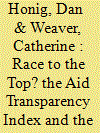| Srl | Item |
| 1 |
ID:
168200


|
|
|
|
|
| Summary/Abstract |
We argue that the World Bank has successfully marshaled the Ease of Doing Business (EDB) Index to amass considerable influence over business regulations worldwide. The Ease of Doing is a global performance indicator (GPI), and GPIs—especially those that rate and rank states against one another—are intended to package information to influence the views of an audience important to the target, such as foreign investors or voters, thus generating pressures that induce a change in the target's behavior. The World Bank has succeeded in shaping the global regulatory environment even though the bank has no explicit mandate over regulatory policy and despite questions about EDB accuracy and required policy tradeoffs. We show that the EDB has a dominating market share among business climate indicators. We then use media analyses and observational data to show that EDB has motivated state regulatory shifts. States respond to being publicly ranked and some restructure bureaucracies accordingly. Next we explore plausible influence channels for the EDB ranking and use an experiment involving US portfolio managers to build on existing economics research and examine whether the rankings influence investor sentiment within the experiment. Using a case study of India's multiyear interagency effort to rise in the EDB rankings, as well as its decision to create subnational EDB rankings, we bring the strands of the argument together by showing how politicians see the ranking as affecting domestic politics, altering investor sentiment, and engaging bureaucratic reputation. Overall, a wide variety of evidence converges to illustrate the pressures through which the World Bank has used state rankings to achieve its vision of regulatory reform.
|
|
|
|
|
|
|
|
|
|
|
|
|
|
|
|
| 2 |
ID:
168199


|
|
|
|
|
| Summary/Abstract |
Recent studies on global performance indicators (GPIs) reveal the distinct power that nonstate actors can accrue and exercise in world politics. How and when does this happen? Using a mixed-methods approach, we examine the impact of the Aid Transparency Index (ATI), an annual rating and rankings index produced by the small UK-based NGO Publish What You Fund. The ATI seeks to shape development aid donors' behavior with respect to their transparency—the quality and kind of information they publicly disclose. To investigate the ATI's effect, we construct an original panel data set of donor transparency performance before and after ATI inclusion (2006–2013) to test whether (and which) donors alter their behavior in response to inclusion in the ATI. To further probe the causal mechanisms that explain variations in donor behavior we use qualitative research, including over 150 key informant interviews conducted between 2010 and 2017. Our analysis uncovers the conditions under which the ATI influences powerful aid donors. Our mixed-methods evidence reveals how this happens. Consistent with Kelley and Simmons's central argument that GPIs exercise influence via social pressure, we find that the ATI shapes donor behavior primarily via direct effects on elites: the diffusion of professional norms, organizational learning, and peer pressure.
|
|
|
|
|
|
|
|
|
|
|
|
|
|
|
|